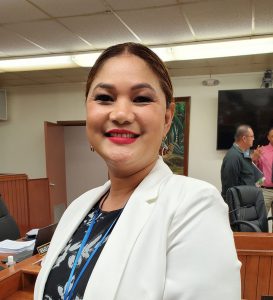Magofna questions CHCC practice of not remitting Chapter 2 and 7 taxes
Sen. Corina L. Magofna has questioned the Commonwealth Healthcare Corp.’s practice of not remitting its employees’ Chapter 2 and 7 taxes to the Division of Revenue and Taxation.
“I’m very, very surprised to hear that kind of practice because that is definitely not in compliance with [Generally Accepted Accounting Principles],” said Magofna during the Senate joint meeting of the Health, Education, and Welfare Committee, and Public Utilities, Transportation, and Communications Committee last Friday.
This practice came to light after Senate President Edith E. DeLeon Guerrero (D-Saipan) asked CHCC what particular revenue sources they are tapping into to maintain operations—considering the magnitude of the $91 million that the government owes CHCC—to allow them to stay afloat despite operating on a deficit—as CHCC claims.
CHCC chief financial officer Perlita Santos said the management has opted to defer payments to related party. “We have not remitted Chapter 2 and 7 taxes and have not been paying [the Commonwealth Utilities Corp.]. So those are the most significant accounts that we are not remitting,” Santos said.
Santos noted they are remitting 100% U.S. taxes.
“We are only withholding our related party taxes as offset to the related party obligations,” she said.
DeLeon Guerrero said this puts added pressure on the Legislature to do more analysis on the revenue collection of the Commonwealth. She asked CHCC to provide the Senate the total amount of Chapter 2 and Chapter 7 taxes that have been withheld to date that are still appearing on CHCC’s books as not remitted to Revenue and Taxation.
Sen. Donald M. Manglona (Ind-Rota) clarified that the central government owes CHCC $91 million because CHCC is the one that covers the local share of Medicaid if the central government does not remain current.
Santos said they have a valid receivable from the CNMI government to offset.
“If we do not withhold those Chapter 2 and 7, those will essentially be an unfunded match, which would be questioned by Medicaid why [we are] using an unfunded match as a cost. Then we would not be entitled for the Medicaid federal match,” Santos said.
She said they are funding the Medicaid local share somehow so that they will not jeopardize the entire CNMI from benefitting from Medicaid itself.
Magofna said she understands the rationale and that it makes sense logically, but she is looking at it from a legal standpoint and asked what the opinion of CHCC’s legal counsel is about that practice.
CHCC chief executive officer Esther L. Muña said there had been discussions with former Finance secretaries Larissa Larson and David Atalig that there are some decisions that have to be made.
“They understand that there has to be an offset,” Muña said.
Santos said that Larson and Atalig have agreed to the offset because it is for the greater good of the entire CNMI Medicaid to allow it.
“$91 million owed to us is still greater than [our] CUC’s arrears and Chapter 2 and 7 combined,” she said.
Magofna asked if CHCC had asked for the opinion of the Office of the Attorney General, because she believes there are some very serious consequences, especially for employees who filed their tax returns and are waiting on those withholdings for tax reimbursement.
Santos noted, though, that so far to date, their employees have been receiving tax reimbursement.




























